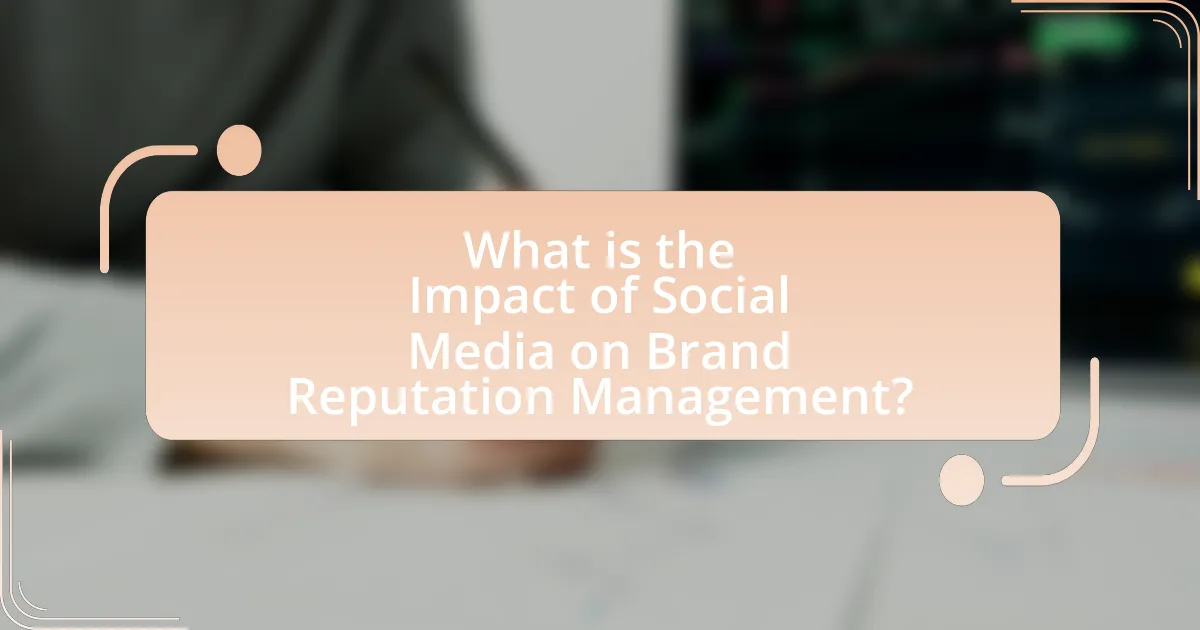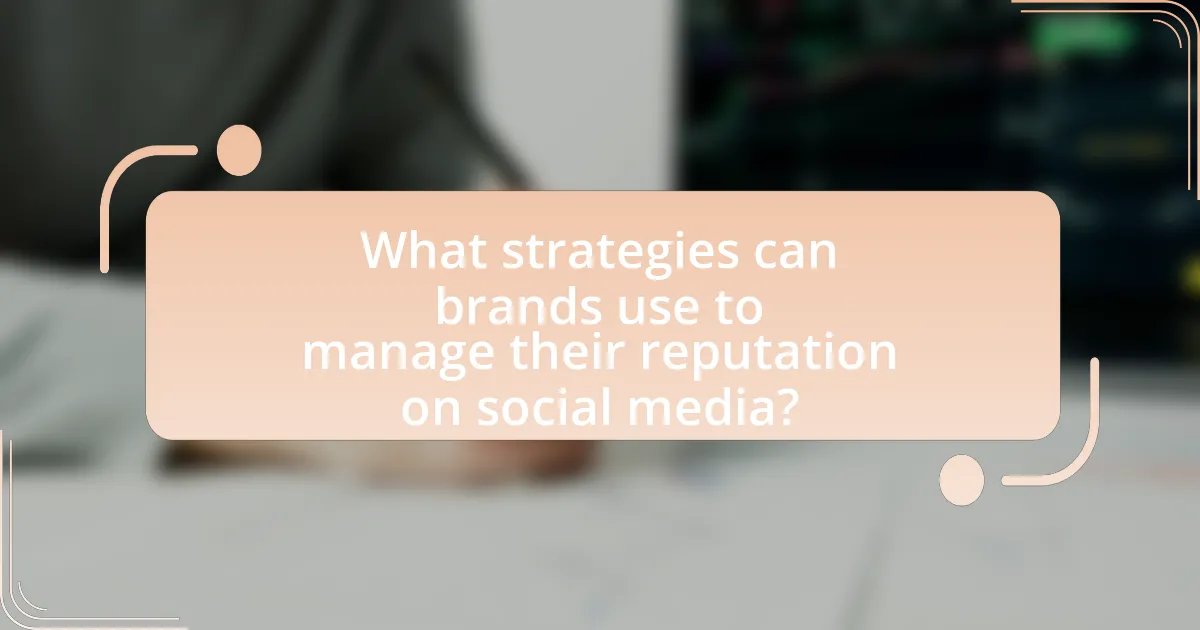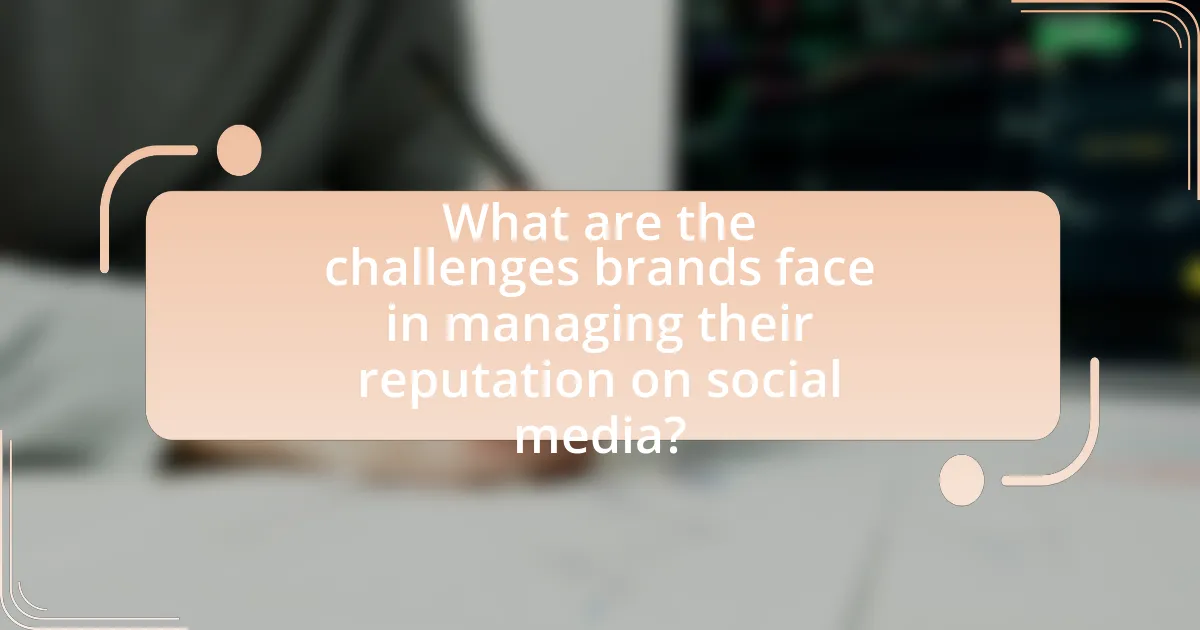The article examines the significant impact of social media on brand reputation management, highlighting how real-time communication and consumer feedback shape public perception. It discusses the influence of user-generated content and reviews, emphasizing their role in building trust and credibility. The article also addresses the importance of timely engagement in fostering customer loyalty, the consequences of a damaged reputation, and strategies for effective reputation management on social media. Additionally, it explores the challenges brands face, including misinformation and cultural sensitivities, while outlining best practices for maintaining a positive brand image in the digital landscape.

What is the Impact of Social Media on Brand Reputation Management?
Social media significantly influences brand reputation management by enabling real-time communication and feedback between brands and consumers. This platform allows brands to engage directly with their audience, fostering transparency and trust. According to a 2021 survey by Sprout Social, 70% of consumers feel more connected to brands that respond to their inquiries on social media, highlighting the importance of active engagement in shaping public perception. Additionally, negative comments or reviews can spread rapidly on social media, making it crucial for brands to monitor their online presence and address issues promptly to mitigate potential damage to their reputation.
How does social media influence brand perception?
Social media significantly influences brand perception by shaping consumer opinions and experiences in real-time. Platforms like Facebook, Twitter, and Instagram allow users to share their thoughts, reviews, and experiences, which can enhance or damage a brand’s image. For instance, a study by Sprout Social found that 79% of consumers expect brands to respond to their social media inquiries within 24 hours, indicating that timely engagement can positively affect brand perception. Conversely, negative comments or reviews can spread rapidly, leading to a decline in consumer trust and loyalty. Therefore, the interaction and feedback on social media directly impact how consumers view and relate to a brand.
What role do user-generated content and reviews play in shaping brand reputation?
User-generated content and reviews significantly influence brand reputation by providing authentic insights into customer experiences. These contributions create a sense of trust and credibility, as 79% of consumers trust online reviews as much as personal recommendations, according to a study by BrightLocal. Positive user-generated content can enhance a brand’s image, while negative reviews can lead to reputational damage, affecting consumer perception and purchasing decisions. Furthermore, brands that actively engage with user-generated content demonstrate responsiveness, which can further bolster their reputation.
How do social media interactions affect customer trust and loyalty?
Social media interactions significantly enhance customer trust and loyalty by fostering direct communication and engagement between brands and consumers. When brands actively respond to customer inquiries and feedback on social media platforms, they demonstrate transparency and accountability, which are crucial for building trust. According to a study by Sprout Social, 70% of consumers feel more connected to a brand when they receive a response on social media, indicating that timely interactions can strengthen customer relationships. Furthermore, positive social media interactions can lead to increased brand loyalty, as customers are more likely to remain loyal to brands that engage with them effectively. This is supported by research from the Journal of Business Research, which found that brands with higher engagement rates on social media experience greater customer retention and loyalty.
Why is brand reputation important in the digital age?
Brand reputation is crucial in the digital age because it directly influences consumer trust and purchasing decisions. In an environment where information spreads rapidly through social media, a positive brand reputation can enhance customer loyalty and attract new clients, while a negative reputation can lead to significant financial losses. According to a 2021 survey by Edelman, 81% of consumers stated that they must be able to trust the brand to buy from them, highlighting the importance of reputation in driving sales and engagement. Additionally, brands with strong reputations can command higher prices and enjoy better market positioning, as evidenced by a 2020 study from the Harvard Business Review, which found that companies with positive reputations outperform their competitors in terms of stock performance and customer retention.
What are the consequences of a damaged brand reputation?
A damaged brand reputation leads to significant financial losses and decreased customer trust. Companies with tarnished reputations often experience a decline in sales, as 78% of consumers will stop purchasing from a brand after a negative experience, according to a study by PwC. Additionally, a damaged reputation can result in increased marketing costs, as businesses must invest more in public relations and advertising to rebuild trust. Furthermore, employee morale and retention may suffer, as 50% of employees are less likely to work for a company with a poor reputation, impacting overall productivity and company culture.
How can a strong brand reputation lead to competitive advantage?
A strong brand reputation leads to competitive advantage by fostering customer trust and loyalty, which directly influences purchasing decisions. When consumers perceive a brand positively, they are more likely to choose it over competitors, even at a higher price. For instance, a study by Nielsen found that 59% of consumers prefer to buy new products from brands they are familiar with, highlighting the importance of brand reputation in driving sales. Additionally, a solid reputation can reduce marketing costs, as satisfied customers often become brand advocates, promoting the brand through word-of-mouth and social media, further enhancing its market position.

What strategies can brands use to manage their reputation on social media?
Brands can manage their reputation on social media by actively engaging with their audience, monitoring brand mentions, and responding promptly to feedback. Active engagement fosters a positive relationship with consumers, as brands that interact with their audience can build trust and loyalty. Monitoring brand mentions allows companies to identify potential issues before they escalate; for instance, a study by Sprout Social found that 70% of consumers feel more positive about a brand when they receive a response to their inquiries. Prompt responses to both positive and negative feedback demonstrate that a brand values customer opinions, which can mitigate damage from negative comments and enhance overall brand perception.
How can brands effectively monitor their online reputation?
Brands can effectively monitor their online reputation by utilizing social media listening tools and analytics platforms. These tools allow brands to track mentions, sentiment, and engagement across various social media channels, providing real-time insights into public perception. For instance, a study by Sprout Social found that 70% of consumers are more likely to recommend a brand that responds to their social media inquiries, highlighting the importance of active engagement in reputation management. By regularly analyzing this data, brands can identify trends, address negative feedback promptly, and enhance their overall online presence.
What tools and techniques are available for social media monitoring?
Social media monitoring tools and techniques include software applications like Hootsuite, Sprout Social, and Brandwatch, which facilitate tracking brand mentions, sentiment analysis, and engagement metrics. These tools enable businesses to analyze conversations across various platforms, providing insights into public perception and brand reputation. For instance, a report by Statista indicates that 54% of social media managers utilize monitoring tools to enhance their strategies, demonstrating the effectiveness of these resources in managing brand reputation. Techniques such as keyword tracking, sentiment analysis, and competitor benchmarking further enhance the monitoring process, allowing brands to respond proactively to customer feedback and market trends.
How can brands respond to negative feedback on social media?
Brands can respond to negative feedback on social media by acknowledging the issue, addressing the customer’s concerns, and providing a solution. This approach demonstrates that the brand values customer feedback and is committed to improving its services. Research indicates that 70% of consumers are more likely to recommend a brand that responds to their complaints on social media, highlighting the importance of timely and empathetic responses. Additionally, brands should monitor social media channels regularly to identify and address negative feedback promptly, as this proactive strategy can mitigate potential damage to brand reputation.
What proactive measures can brands take to enhance their reputation?
Brands can enhance their reputation by actively engaging with their audience on social media platforms. This engagement includes responding promptly to customer inquiries, addressing complaints transparently, and sharing positive user-generated content. Research indicates that brands that interact with customers on social media see a 20-40% increase in customer loyalty, as highlighted in a study by Bain & Company. Additionally, maintaining a consistent brand voice and values across all channels reinforces trust and credibility, which are essential for a positive reputation.
How can brands create positive content that resonates with their audience?
Brands can create positive content that resonates with their audience by understanding their audience’s values and preferences, and aligning their messaging accordingly. Research indicates that 70% of consumers prefer brands that reflect their personal values, highlighting the importance of authenticity in content creation. By utilizing storytelling techniques that evoke emotions and foster connections, brands can enhance engagement. Additionally, incorporating user-generated content can strengthen community ties and build trust, as 79% of consumers say user-generated content highly impacts their purchasing decisions. Thus, aligning content with audience values, employing emotional storytelling, and leveraging user-generated content are effective strategies for brands to create positive resonance.
What role does influencer marketing play in brand reputation management?
Influencer marketing significantly enhances brand reputation management by leveraging the trust and credibility that influencers have with their audiences. Brands that collaborate with reputable influencers can effectively shape public perception, as influencers often serve as trusted sources of information and recommendations. According to a study by Nielsen, 92% of consumers trust recommendations from individuals over brands, highlighting the power of influencer endorsements in building brand credibility. Furthermore, influencer marketing can facilitate authentic engagement, allowing brands to connect with their target audience in a more relatable manner, which is crucial for maintaining a positive brand image in the digital landscape.

What are the challenges brands face in managing their reputation on social media?
Brands face several challenges in managing their reputation on social media, including rapid information dissemination, negative feedback amplification, and the difficulty of controlling narratives. The speed at which information spreads on platforms like Twitter and Facebook can lead to misinformation or negative comments going viral, which can significantly damage a brand’s image within hours. Additionally, social media allows dissatisfied customers to share their experiences widely, often leading to a disproportionate focus on negative feedback compared to positive interactions. According to a study by Sprout Social, 70% of consumers report that they are more likely to share negative experiences than positive ones, highlighting the challenge brands face in countering negative perceptions. Furthermore, brands struggle to maintain a consistent voice and message across various platforms, which can lead to mixed signals and confusion among consumers. These factors collectively complicate reputation management efforts for brands in the digital landscape.
What risks are associated with social media for brand reputation?
Social media poses several risks to brand reputation, including negative customer feedback, misinformation, and potential crises. Negative customer feedback can spread rapidly, as dissatisfied customers often share their experiences publicly, leading to a tarnished brand image. Misinformation can circulate quickly, causing confusion and damaging trust; for instance, a false claim about a product can lead to significant backlash. Additionally, social media crises, such as viral controversies or public relations missteps, can escalate quickly, resulting in long-term damage to a brand’s reputation. According to a study by the Harvard Business Review, 70% of consumers are influenced by online reviews, highlighting the significant impact of social media interactions on brand perception.
How can misinformation and rumors impact brand perception?
Misinformation and rumors can significantly damage brand perception by eroding consumer trust and altering public opinion. When false information circulates, it can lead to negative associations with the brand, resulting in decreased customer loyalty and sales. For instance, a study by the Pew Research Center found that 64% of Americans believe that misinformation has caused confusion about important issues, which can extend to perceptions of brands involved in those issues. Additionally, brands that fail to address misinformation promptly may appear untrustworthy, further compounding the negative impact on their reputation.
What are the challenges of maintaining consistency across multiple platforms?
Maintaining consistency across multiple platforms presents challenges such as varying audience expectations, differing platform algorithms, and the need for tailored content. Each platform, like Facebook, Twitter, and Instagram, has unique user demographics and engagement styles, which complicates the delivery of a unified brand message. Additionally, algorithms on these platforms prioritize different types of content, making it difficult to ensure that the same message reaches audiences effectively. Research indicates that 60% of consumers expect consistent brand experiences across all channels, highlighting the importance of cohesive messaging for brand reputation management.
How do cultural differences affect brand reputation management on social media?
Cultural differences significantly affect brand reputation management on social media by influencing how messages are perceived and interpreted across diverse audiences. For instance, brands must tailor their communication strategies to align with local values, beliefs, and social norms to avoid misunderstandings or backlash. Research indicates that 70% of consumers are more likely to engage with brands that demonstrate cultural sensitivity, highlighting the importance of adapting content to resonate with specific cultural contexts. Failure to recognize these differences can lead to negative publicity, as seen in cases where brands faced backlash for culturally insensitive advertisements, resulting in a decline in consumer trust and loyalty.
What strategies can brands employ to navigate cultural sensitivities?
Brands can navigate cultural sensitivities by conducting thorough cultural research, engaging with diverse communities, and implementing inclusive marketing strategies. Conducting cultural research allows brands to understand the values, beliefs, and practices of different groups, which is essential for avoiding missteps. Engaging with diverse communities fosters trust and provides insights that can guide brand messaging. Implementing inclusive marketing strategies ensures that campaigns resonate positively across various cultural contexts, reducing the risk of backlash. For example, brands like Nike and Coca-Cola have successfully embraced cultural diversity in their advertising, leading to enhanced brand loyalty and positive public perception.
How can brands tailor their messaging for diverse audiences?
Brands can tailor their messaging for diverse audiences by employing targeted communication strategies that consider cultural, linguistic, and demographic differences. This involves conducting thorough audience research to understand the values, preferences, and behaviors of various segments. For instance, a study by the Pew Research Center found that 72% of adults use social media, but usage patterns vary significantly across different age groups and ethnicities, indicating the need for customized content. By utilizing data analytics and social listening tools, brands can create personalized messages that resonate with specific audiences, thereby enhancing engagement and brand loyalty.
What best practices should brands follow for effective reputation management on social media?
Brands should actively monitor their social media presence to effectively manage their reputation. This involves tracking mentions, comments, and reviews across platforms to identify potential issues early. Engaging with customers promptly and professionally helps to address concerns and demonstrates that the brand values feedback. Additionally, brands should maintain a consistent voice and messaging that aligns with their values, which fosters trust and loyalty among followers. According to a 2021 survey by Sprout Social, 70% of consumers are more likely to support a brand that responds to their inquiries on social media, highlighting the importance of engagement in reputation management.
How can brands build a crisis communication plan for social media?
Brands can build a crisis communication plan for social media by establishing clear protocols, identifying key stakeholders, and preparing pre-approved messaging templates. This structured approach ensures rapid response during a crisis, which is critical given that 78% of consumers expect brands to respond to social media inquiries within an hour.
First, brands should create a crisis communication team that includes members from public relations, legal, and social media departments to ensure diverse perspectives and expertise. Next, they must identify potential crisis scenarios relevant to their industry and develop tailored responses for each situation.
Additionally, brands should monitor social media channels continuously to detect emerging issues early. According to a study by Sprout Social, 70% of consumers believe that brands should be proactive in addressing potential crises. By preparing in advance, brands can mitigate damage to their reputation and maintain consumer trust during challenging times.
What are the key elements of a successful social media engagement strategy?
The key elements of a successful social media engagement strategy include understanding the target audience, creating valuable content, fostering community interaction, and analyzing performance metrics. Understanding the target audience allows brands to tailor their messaging and content to meet the specific interests and needs of their followers, which is essential for engagement. Creating valuable content, such as informative posts, entertaining videos, or interactive polls, encourages users to engage and share, thereby increasing reach. Fostering community interaction through responding to comments, hosting live sessions, and encouraging user-generated content builds a sense of belonging and loyalty among followers. Finally, analyzing performance metrics, such as engagement rates and audience growth, enables brands to refine their strategies based on what resonates most with their audience, ensuring continuous improvement and relevance in the social media landscape.